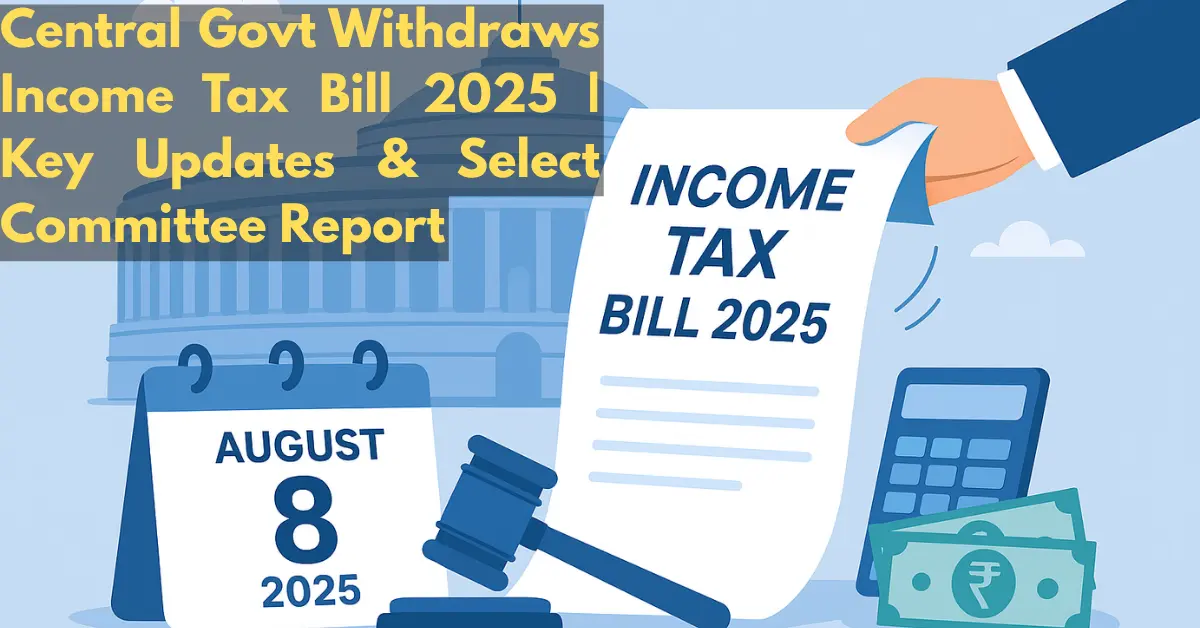Tabled in the Lok Sabha on 13 February, The bill seeks to replace six-decade-old Income-Tax Act (ITA), which contains over 300 sections and has been amended nearly 3000 times over the past five decades. The government subsequently withdrew the bill and redrafted it, addressing multiple drafting errors, ambiguities and concerns that had been raised by the Parliamentary Select Committee, to be reintroduced on 11 August, 2025.
This exit is a significant event in the direct tax reform of India. The Government plans to take on board the Select Committee feedback and Send over a clearer, fairer and more consistent Income Tax Bill for Parliament.
Historical Pattern of the Income Tax Bill 2025
Of course, the Income Tax Bill 2025 was meant to be a watershed reform of India’s direct tax laws. Its objectives were:
- Simplify Tax laws language to increase clarity and compliance.
- Not increase tax burden, but keep existing slabs and categories.
- The penalties for minor violations can be draconian — they should be reduced so notice matters and compliance is voluntaristic.
- Removing obsolete provisions and avoiding litigations
- Strengthen mechanisms and introduce digitization in tax administration.
The bill consisted of 23 chapters, 536 sections and 16 schedules. It aimed at replacing the archaic Income-Tax Act, 1961 with a cleaner and easy-to-understand modern tax regime.
Why the Bill Was Withdrawn
Which is why the bill on taxing incomes was agreed to be withdrawn;
Finance Minister, Nirmala Sitharaman, said in Parliament that the first draft had issues with drafting inconsistencies, use of language and even cross-referencing aspects. The 285 recommendations and 32 major changes required have been documented in a detailed report submitted by the Parliamentary Select Committee, chaired by MP Baijayant Panda.
The ministry said in a statement that the government has withdrawn the Income Tax Bill 2025 to avoid any confusion through having multiple versions and bring about a legalistic regime in line with unparted legislative intent. Thus this is a choice for a better and more consistent tax law.
Main Concerns Posed by the Parliamentary Select Council
Some of the critical issues identified by the Parliamentary Select Committee were:
Clause 21 (Annual Value of Property)
The language for vacant properties was not clear The committee suggested explicit deletion of any reference to “in normal course,” which creates more prescriptive instructions.
Clause 22 – Deductions from House Property Income
Contradiction with standard deductions is not narrated clearly. To achieve that, the committee proposed clarifying exclude 30% deduction post municipal taxes and extend preconstruction interest deduction to rented properties.
Clause 19 – Deduction from Salary
It is proposed that the deduction in respect of commuted pension shall be allowed under “income from other sources” for non-employees, by referring this benefit to employees also.
Clause 20 — Commercial Property Classification
The bill’s language could classify temporarily unoccupied commercial properties as house property. It was recommended by the committee to replace “occupied” with “as he may occupy” so that tax was not levied wrongly.
The goals of the amendments to this new law are to help with equal treatment, reduce as many errors in interpretation and improve management in alignment with profit distribution.
Highlights of the Amended Income Tax Bill
Most of the Select Committee proposals will be included in at least part of the revised Income Tax Bill 2025 which is due to be reintroduced on 11 August, 2025 This will help taxpayers in every possible way and it will bring a clear, consolidated & technology driven indirect tax Law.
The new draft will keep current tax rates and dates while aiming to clarify and reduce litigation risks. The legislation will give rule-making powers to the Central Board of Direct Taxes (CBDT) and will introduce the concept of “tax year” for differentiating financial years from assessment years.
Significance of the withdrawal of Income Tax Bill
Pulling the Income Tax Bill 2025 is no setback It is rather a step forward to make direct tax laws in India convenient, certain and fair. The amended bill is aimed to develop the tax structure more responsive, ease taxpayer assurance and compliance by way of technology-based assistance.
This is a meaningful development for attorneys, tax specialists, and law students. This heralds a new chapter in tax-related legislation of India in that it replaces archaic provisions with the modern era.
Summary and Key Takeaways
- Withdrawn — the Income Tax Bill 2025 on August 8 to make corrections and improve it.
- Revised bill will be reintroduced by the govt. incorporating Select Committee recommendations on August 11
- Some of its key problems include property valuation deductions, and categorization of property types.
- The bill intends to rationalise tax laws and does not propose any new tax slabs, or an increase in the burden.
- The very act of withdrawal suggests that lawmakers are serious about writing a comprehensive tax code — from one that works if you use carbon paper and a typewriter to one that recognizes the types of technology companies can actually use.








